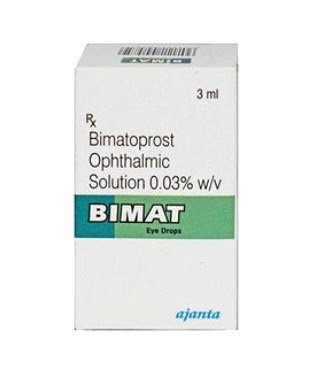What is Bimatoprost?
Bimatoprost is a medication that was originally developed to treat glaucoma, a condition that affects the eyes. However, it has also been studied and used off-label for the treatment of hair loss, particularly a condition called androgenetic alopecia (male or female pattern baldness).
Does Bimatoprost treat hair loss?
The exact mechanism by which bimatoprost promotes hair growth is not fully understood. It is believed to prolong the growth phase of the hair follicles, increase the number of hairs in the growth phase, and stimulate the hair follicles to produce thicker, longer, and darker hair.Clinical studies have shown promising results in the use of bimatoprost for hair loss. In a study involving individuals with androgenetic alopecia, bimatoprost was found to increase hair density and overall hair count.
However, it's important to note that individual results may vary, and the effectiveness of bimatoprost for hair loss may depend on various factors such as the underlying cause of hair loss, the extent of the condition, and individual response to the medication.
Negative side effects of Bimatoprost
Bimatoprost, like any medication, can have potential side effects. However, it's important to note that not everyone will experience these side effects, and the severity and frequency can vary from person to person. Some common side effects associated with the use of bimatoprost include:
Eye-related side effects: Bimatoprost was initially developed for the treatment of glaucoma, so it can affect the eyes. These side effects may include eye redness, itching, burning or stinging sensation, dry eyes, increased sensitivity to light, and changes in eyelash growth or appearance.
Skin-related side effects: Bimatoprost can sometimes cause skin reactions at the application site, such as skin irritation, itching, or darkening of the skin.
Hair-related side effects: While bimatoprost is used for hair growth, it can also cause unwanted hair growth in other areas where the medication comes into contact. This includes the possibility of hair growth on the face or other unintended areas.
Systemic side effects: Although rare, there have been reports of systemic side effects associated with the use of bimatoprost. These may include headache, dizziness, dry mouth, flu-like symptoms, and changes in blood pressure or heart rate.
Eye-related side effects: Bimatoprost was initially developed for the treatment of glaucoma, so it can affect the eyes. These side effects may include eye redness, itching, burning or stinging sensation, dry eyes, increased sensitivity to light, and changes in eyelash growth or appearance.
Skin-related side effects: Bimatoprost can sometimes cause skin reactions at the application site, such as skin irritation, itching, or darkening of the skin.
Hair-related side effects: While bimatoprost is used for hair growth, it can also cause unwanted hair growth in other areas where the medication comes into contact. This includes the possibility of hair growth on the face or other unintended areas.
Systemic side effects: Although rare, there have been reports of systemic side effects associated with the use of bimatoprost. These may include headache, dizziness, dry mouth, flu-like symptoms, and changes in blood pressure or heart rate.
Should you try Bimatoprost?
If you experience any severe or persistent side effects, it's essential to seek medical attention promptly.
If you are considering using bimatoprost for hair loss, it is crucial to consult with a qualified healthcare professional, such as a dermatologist or a hair loss specialist.
They can evaluate your specific situation, discuss the potential benefits and risks of using bimatoprost, and provide appropriate guidance and recommendations based on your individual needs.
It's worth noting that bimatoprost is available in different formulations, including as an ophthalmic solution and as a topical solution specifically formulated for hair loss, so the appropriate formulation would be determined by your healthcare provider.
Ad.



Comments
Post a Comment